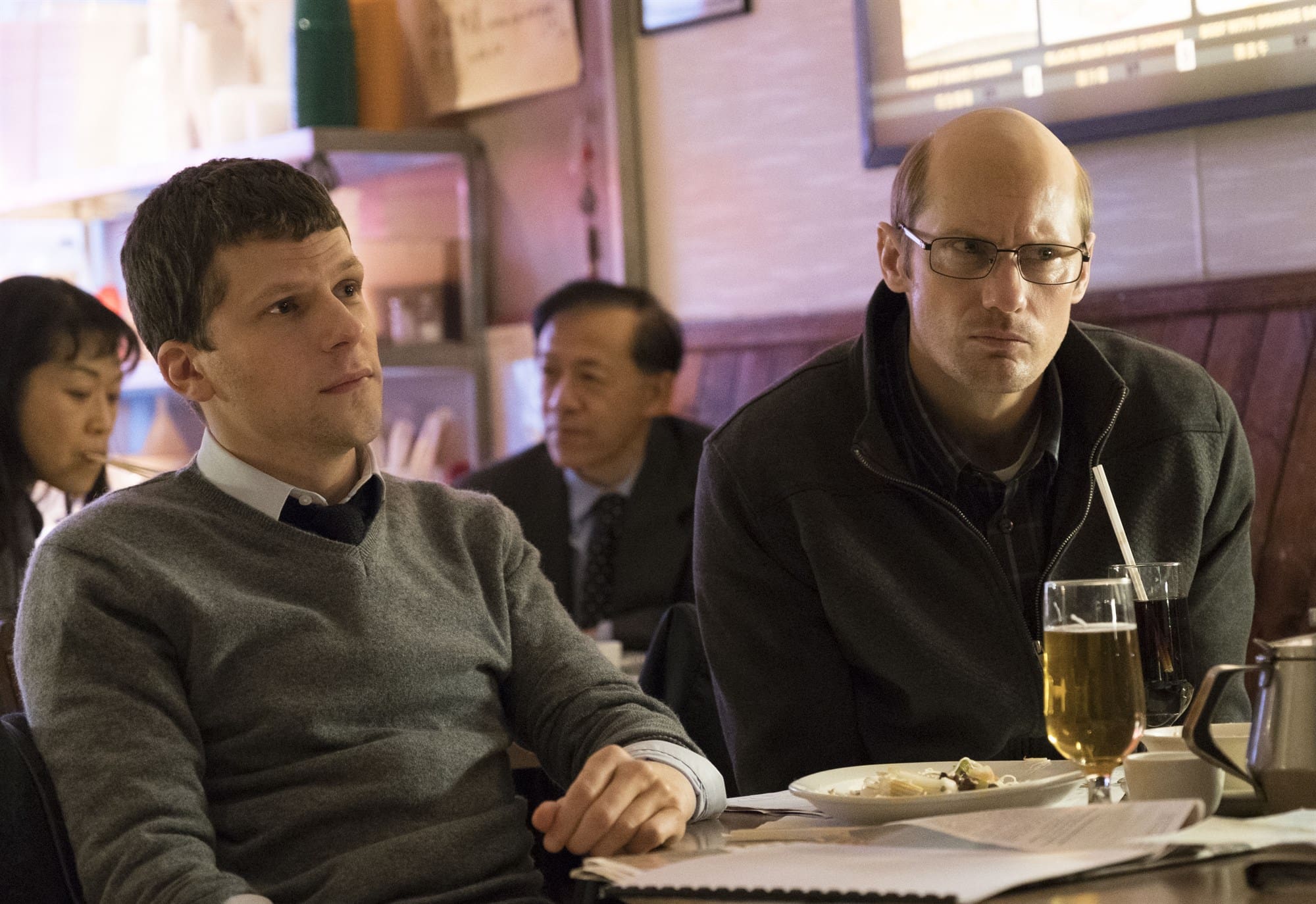
We’ve seen a lot of movies about stock market grifters. In 1987, there was Wall Street, which told us greed was good mere months after the market took a decisive dip. More recently, there was Leonardo DiCaprio’s Oscar-nominated turn as a charismatic anti-hero in 2013’s The Wolf of Wall Street and in 2015, we watched a bunch of actors embarrass themselves in their desperation for Oscars in The Big Short. Now comes writer-director Kim Nguyen’s The Hummingbird Project. However, while the trailers make it seem like the same coke-fueled con thriller we’ve seen before, the film is far more melancholy, smart and subversive than it first appears.
The story has all the elements we expect. There’s Jesse Eisenberg as the fast-talking Vincent Zaleski, who feels indebted to the actor’s turn as Mark Zuckerberg in The Social Network. There’s Alexander Skarsgård as Vincent’s cousin Anton, the kind of on-the-spectrum mathematical genius that Christian Bale did so well in The Big Short. There’s even Salma Hayek as the villainous Eva Torres, a modern Gordon Gekko in heels who’s the vindictive head of the brokerage firm Vincent and Anton screw over on their way to fulfilling their crazy plan.
That plan, by the way, is where The Hummingbird Project starts to distinguish itself. Rather than hinging on insider trading or using Margot Robbie in a bathtub to explain what short selling is, Nguyen’s conceit is deceptively simple: by building a fiber-optic cable line that runs in a perfectly straight line from Kansas to New Jersey, Vincent and Anton will gain a 16 millisecond–roughly the length of one flap of a hummingbird’s wing–trading advantage over their competitors. However, what provides much of the film’s drama is just how difficult that simple dream is to achieve.
Some of the obstacles Vincent and Anton face are fun to watch. Take the scene where Vincent and building project manager, Mark Vega (Michael Mando), sweet-talk the first person from whom they have to purchase land for the project. When the scene starts, it’s Vega who tries to make the pitch. He’s the regular working-class guy, he should have a much easier time connecting with this curmudgeonly Kansas homeowner. But things start to sour when the man asks where Vega is originally from and Vincent has to step in before they lose the deal altogether. The result is exactly the anxiety-fueled tour-de-force monologuing that’s always made Eisenberg so appealing and he does it again and again throughout.
Still, the more we see Vincent talk his way to success by exploiting everyone he can–including Anton–the harder it is not to wonder: why should we care if Vincent and Anton achieve their insane dream at all? Sure, we signed up for a movie about brilliant financial guys on the make, but Nguyen never really convinces us that we should care about their increasingly quixotic quest—especially as it begins to affect Vincent’s health and requires Anton to dissociate from his wife and children. However, as it turns out, getting us to root for the Zaleskis’ scheme isn’t Nguyen’s intention at all.
That becomes clear late in the film, in a scene where Vincent and Vega try to convince an Amish farmer in Pennsylvania to let them use his land. Rather than be convinced by Vincent’s promises of progress and modernization, the farmer (Johan Heldenbergh) is, unsurprisingly, horrified, but Vincent can’t understand why. He’s so wrapped up in his fantasy project that he can’t imagine why it wouldn’t be just as enticing to everyone else. The answer is simple: the whole venture and the fabulous wealth it promises have little to do with real life. They’re already rich, this will only make them richer and even if Vincent and Anton build the line, they know their competitors will outdo them in, at most, two years. So, the project, and by extension the whole financial system, are ridiculous, an endless rat race that can only leave them materially rich but spiritually bankrupt.
The Hummingbird Project is not unique in concluding that finance guys are evil. Wall Street, The Big Short and The Wolf of Wall Street all basically come to that same conclusion. However, it is unique in suggesting that the problem isn’t just individuals, but the entire American financial system and the only solution is to dismantle it completely. While that concept has certainly been in the zeitgeist ever since Occupy Wall Street–which would have happened right around the film’s 2011 setting–Nguyen’s film isn’t so much about a fiery, revolutionary end, but the simple realization that that 16 milliseconds can be about more than just the time it takes to make money, it can also contain a whole lot of life.
Rating: 7/10
The Hummingbird Project is currently playing in select theaters.
https://www.youtube.com/watch?v=n5_QL422tHQ

